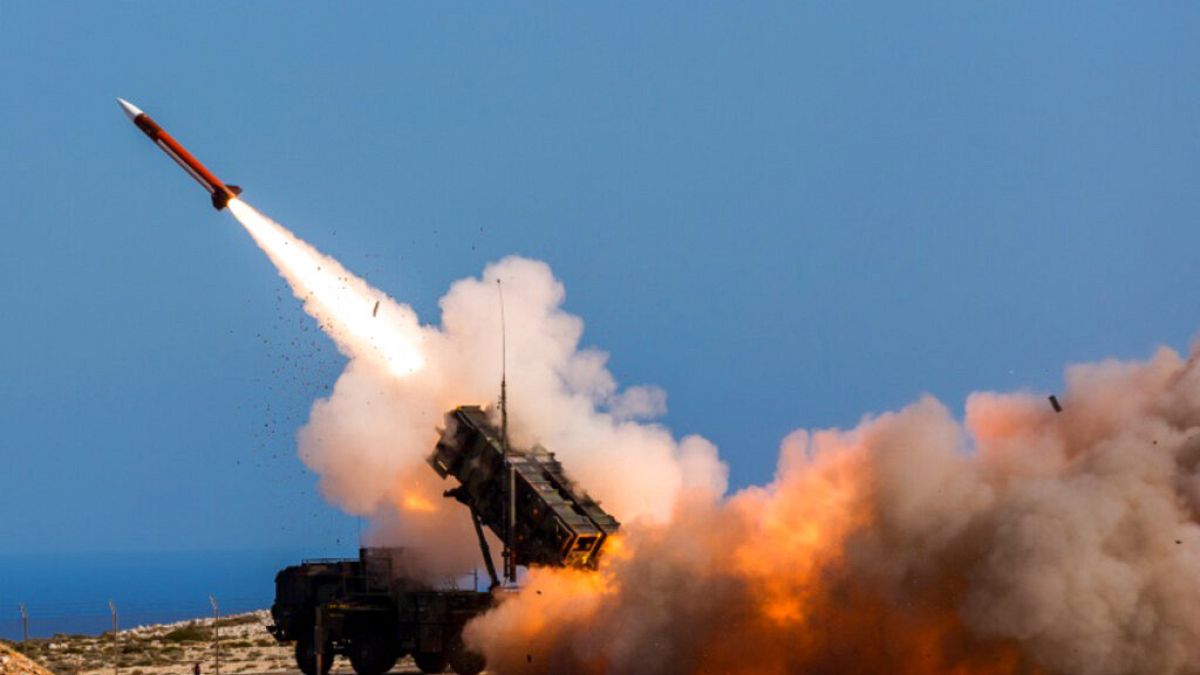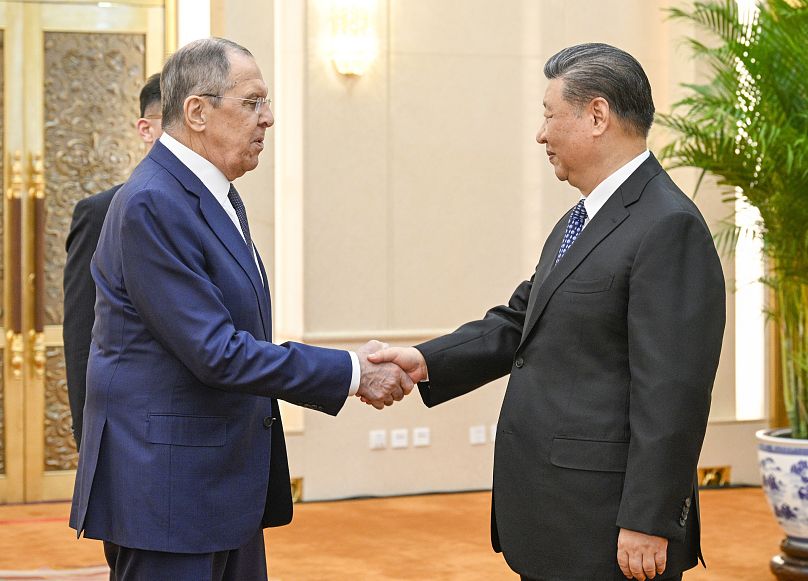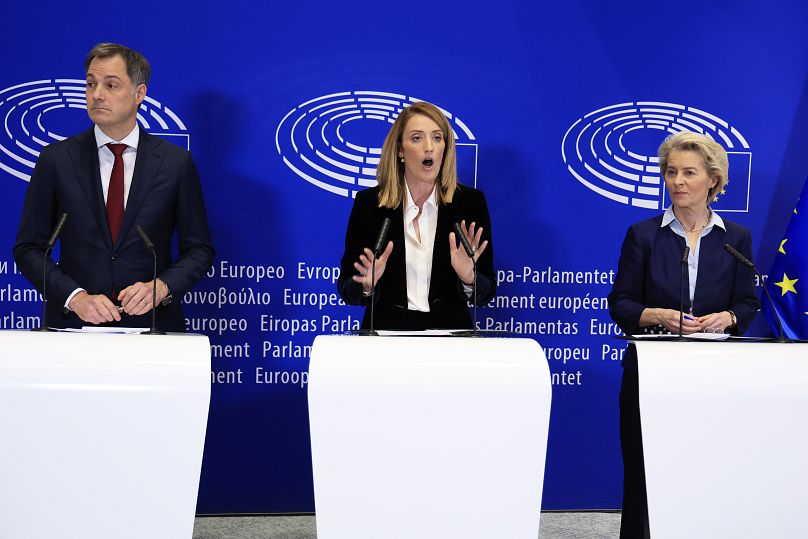Berlin will send much-needed air defence systems to Kyiv as Moscow escalates attacks on Ukraine's power plants.
Volodymyr Zelenskyy has announced that Germany will supply his country with new Patriot systems and more air defence missiles.
It comes amid continued Russian attacks on Ukraine's power plants, which are hampering energy supplies across the country.
Ukraine's leader thanked his German counterpart Olaf Scholz on social media after the pair had an "important and fruitful phone call."
The German Defence Ministry has also confirmed it will provide Kyiv with another Patriot air defence system.
Zelenskyy urged other countries to help, at a time when Western military aid is faltering and Russian troops go on the offensive.
"Thank you, Olaf, for your leadership. It is a genuine gesture of support at a critical time," the Ukrainian president wrote in a message on X.
"I urge all partner countries to do the same," he added, mentioning a conference on Ukraine's reconstruction scheduled to take place in Berlin.
The German Defence Ministry explained the deployment would be immediate and followed a "request from the Ukrainian government" in coordination with the allies.
UK and US ban trade in some Russian metals
The US and UK announced Friday they had restricted trade of Russian-origin metals – including aluminium, copper and nickel – on global metal exchanges and in derivatives trading.
The move could hurt Russia economically as it is a key exporter of metals, though critics question its likely effectiveness.
US Treasury Secretary Janet Yellen said the prohibitions would "target" Russian revenue earned in the ongoing war against Ukraine.
“By taking this action in a targeted and responsible manner, we will reduce Russia’s earnings while protecting our partners and allies from unwanted spill-over effects," she said.
UK Chancellor of the Exchequer Jeremy Hunt said "disabling" Russian President Vladimir Putin's war efforts is best achieved when the UK can "act alongside our allies."
The announcement follows the G7's commitment in February “to reduce Russia’s revenues from metals” as its invasion into Ukraine has dragged on for more than two years.
However, British and American officials have voiced concerns over the ban, saying the economic impact would be negligible.
The US and EU have levied sanctions on Russia’s economy and elite since the war broke out, freezing assets of the country’s Central Bank located outside the country and excluding its financial institutions from the SWIFT bank messaging system.
The US and UK previously sanctioned Russian gold, gas and diamonds.
China providing Russia war parts
Sales of China-made machine tools, microelectronics and other technology that go into weaponry are surging in Russia, according to a US assessment.
Two senior Biden administration officials said in 2023 about 90% of Russia’s microelectronics originated from China. Moscow used these products to make missiles, tanks and aircraft, they said.
Chinese and Russian entities have also been working to jointly produce unmanned aerial vehicles inside Russia, the officials detailed.
China-based companies Wuhan Global Sensor Technology Co., Wuhan Tongsheng Technology Co. Ltd. and Hikvision are providing optical components for use in Russian tanks and armoured vehicles.
Beijing is also working with Russia to improve its satellite and other space-based capabilities for use in Ukraine, a development the officials say could in the longer term increase the threat Russia poses across Europe.
The officials, citing downgraded intelligence findings, said the US has also determined that China is providing imagery to Russia for its war on Ukraine.
US Secretary of State Antony Blinken is expected to travel to China this month for talks and visit the Group of 7 foreign ministers meeting in Capri, Italy next week. He is expected to raise concerns about China's growing indirect support for Russia as Moscow revamps its military and looks to consolidate recent gains in Ukraine.
President Joe Biden has previously raised his concerns directly with Chinese President Xi Jinping about Beijing indirectly supporting Russia’s war effort.
Belgium investigating Russian influencing network
The Belgian federal prosecutor opened an investigation into EU lawmakers accused of receiving payments for spreading pro-Russian propaganda.
Prime Minister Alexander De Croo told reporters on Friday that Belgium's intelligence services had confirmed the "existence of a pro-Russian interference network with activities in several European countries" which is "subject to prosecution" in the country.
A recent investigation led by Czech authorities revealed lawmakers sitting in the European Parliament in Brussels had received cash from a Moscow-backed influence operation to "promote" its propaganda in the bloc.
"The cash payments did not take place in Belgium, but the interference does," De Croo said.
"As Belgium is the seat of the EU institutions, we have a responsibility to uphold every citizen's right to a free and safe vote," he added.
It comes just over two months before EU voters head to the polls to elect 720 members to the European Parliament, and amid mounting fears Kremlin proxies could be using information manipulation to skew the democratic vote.
Three of the major factions of the European Parliament - the centre-left Socialists and Democrats, the centrist Renew Europe and the Greens - have called for a swift investigation, and the parliament's press services have confirmed to Euronews they are "looking into" the allegations.
While De Croo was unable to specify how many EU lawmakers could face prosecution, Czech media citing intelligence officials have said the allegations involve politicians from Germany, France, Poland, Belgium, the Netherlands and Hungary.
The Czech investigation resulted in the sanctioning of two individuals and news company Voice of Europe, through which investigators say the Russian operation had been channelled.
MEP Maximilian Krah of the far-right Alternative for Germany (AfD), has spoken out after being associated with Voice of Europe, asserting that despite giving interviews to the company, he had not benefitted financially.
"There is no specific allegation that I was paid for any of these," Krah said on X. "This shows what to think of the current campaign: Nothing!"


